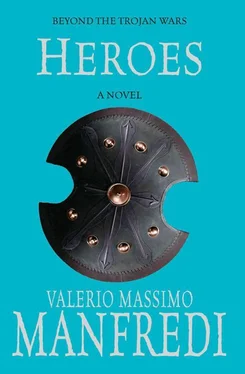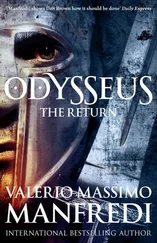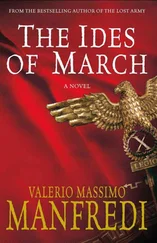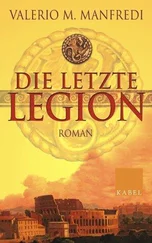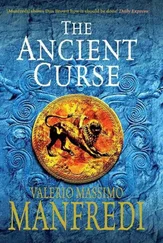Valerio Manfredi - Heroes
Здесь есть возможность читать онлайн «Valerio Manfredi - Heroes» весь текст электронной книги совершенно бесплатно (целиком полную версию без сокращений). В некоторых случаях можно слушать аудио, скачать через торрент в формате fb2 и присутствует краткое содержание. Жанр: Исторические приключения, на английском языке. Описание произведения, (предисловие) а так же отзывы посетителей доступны на портале библиотеки ЛибКат.
- Название:Heroes
- Автор:
- Жанр:
- Год:неизвестен
- ISBN:нет данных
- Рейтинг книги:3 / 5. Голосов: 1
-
Избранное:Добавить в избранное
- Отзывы:
-
Ваша оценка:
- 60
- 1
- 2
- 3
- 4
- 5
Heroes: краткое содержание, описание и аннотация
Предлагаем к чтению аннотацию, описание, краткое содержание или предисловие (зависит от того, что написал сам автор книги «Heroes»). Если вы не нашли необходимую информацию о книге — напишите в комментариях, мы постараемся отыскать её.
Heroes — читать онлайн бесплатно полную книгу (весь текст) целиком
Ниже представлен текст книги, разбитый по страницам. Система сохранения места последней прочитанной страницы, позволяет с удобством читать онлайн бесплатно книгу «Heroes», без необходимости каждый раз заново искать на чём Вы остановились. Поставьте закладку, и сможете в любой момент перейти на страницу, на которой закончили чтение.
Интервал:
Закладка:
Pyrrhus turned and shouted back: ‘Do not fear! When I return this evening I shall send you personally to say what you like to my father; you can tell him yourself that I didn’t keep my word!’ His laughter was lost in the pounding of his horses’ hooves and in the roar of the bronze wheels of his chariot.
In the meanwhile, a host of warriors had exited the gate of Mycenae, descended along the valley of the tombs and taken position on the slope that overlooked the plain. Menelaus saw them and signalled to Pisistratus and Pylades to draw up to the right and to the left while waiting for Pyrrhus to come and occupy the centre. As they had established, Orestes deployed his chariot squadron further south to intercept any Argive foray at their backs. Pisistratus, who was the closest to the walls of Mycenae, noticed that the ranks of the enemy were swelling; he whipped his horses and joined Menelaus. ‘There are a great many of them,’ he said. ‘Many more than I expected. What is Pyrrhus waiting for to take his place? I hope they do not attack now. They could put us in serious difficulty.’
‘No, I don’t think they will. And if they are as numerous as you say, that means we have all of Aegisthus’s forces lined up before us; all the better for us, we can keep a close watch on them. For the time being, we will only shorten the distance between the two arrays.’ Pisistratus obeyed, but Menelaus was mistaken about the strength of the force. Aegisthus was hidden to the north with a strong contingent of Argives and a selected group of Mycenaean chariots. His informers had been reporting on the advance of the Epirote army for some time, and he had been waiting for them since the night before in a well-sheltered valley. When Pyrrhus’s column passed in front of them, he had the attack signal raised in silence. The chariot squadron was arrayed in a wedge formation, and at his next signal they stormed full force at Pyrrhus’s column, still in marching order. The Argive infantry charged forward at a run.
By the time Pyrrhus realized what was happening, the head chariots were already upon them. They mowed through his marching column like a scythe cuts down stalks of ripe wheat, leaving the ground behind them red with blood and scattered with mangled limbs. The cries of the wounded tore through the heavy morning air, resounding over the nearby mountains, and the echo cast them down to the plain. But the armies of Menelaus and Pisistratus were too far away to hear them and Orestes, even more distant, had the neighing of his stallions in his ears, and the din of the chariots as they patrolled vast stretches of the territory all around.
The Locrians of Pyrrhus’s rear guard withdrew to the hills, and the concerted shouts of their commanders lined them up rapidly in combat order. In the immense confusion, the warriors who had fought at Ilium with Ajax Oileus exhorted their comrades to throw all the stones they could find on to the ground before them to hinder the charge of the enemy chariots, and their commanders had the archers advance on all sides. But the terrified Epirotes fled in every direction, falling in droves under the spears of the seasoned chariot-borne marksmen of Aegisthus. The Mycenaean had meanwhile identified Pyrrhus’s chariot and was loosing his squadron, widened into a pincer formation, upon it.
The sun, veiled since early that morning, was now hidden by a front of black clouds driven by a strong northern wind that made the dust swirl under the racing horses’ hooves and under the wheels of the chariots launched at full speed across the plain.
Pyrrhus saw the tips of the pincer closing in on him from the right and from the left, and he felt that all was lost. He turned his eyes towards the hills and saw the barricaded Locrian contingent shooting swarms of arrows at the assailants, decimating the warriors on the enemy war chariots.
‘There!’ shouted Pyrrhus at his charioteer. ‘You must get us there before they close us off. Save me, Automedon, and I will make you king of Tiryns!’
But Automedon had already seen the only route of escape and was urging on his left horse, pulling at the reins with all the strength of the arms that had once prevailed over the gallop of Balius and Xanthus. His pursuers, intuiting the manoeuvre, whipped on their teams to cut off his path. Automedon shouted: ‘I will take you to safety, son of Achilles, but look out! The chariot there on our left will succeed in cutting us off unless you slay the driver.’
But Pyrrhus was not listening, and seemed to be out of his mind; ‘Faster, faster! Force over!’ he shouted.
Automedon could not complete the curve any more sharply without causing the chariot to overturn. He pulled a javelin onehanded from the quiver at his side and thrust it at Pyrrhus, shouting: ‘Strike the charioteer, now!’ Contact with the weapon seemed to rouse Pyrrhus; he grasped the massive ashwood pike in his fist and turned towards the closest chariot, where the enemy was already taking aim with his bow. He weighed the javelin and hurled it with all his might. The point of bronze tore through the charioteer’s cuirass at his waist, pierced through his belly and came out the other side. Without its driver, the chariot careened and overturned, dragging down the two chariots close behind it in a tangled mass of men and horses. Automedon urged his team onward, loosening the reins at their necks; they flew towards the line of the hills, to safety. Aegisthus and the others pulled up short, finding themselves on too wide a curve, and regrouped with the rest of the squadron confronting the Locrians.
Pyrrhus meanwhile had penetrated behind the lines where many of his Epirotes had gathered, and he jumped to the ground, instantly regaining his composure. He reformed the lines into a close, compact array, shield against shield. He ordered the front line soldiers to kneel; each warrior planted the shaft of his weapon into the ground so that only the spearpoints emerged. That would do to hold back the chariots, while he had the rest of the army retreat to more uneven ground. There the enemy would be forced to attack them on foot; they would gain time and perhaps he would be able to open a passage through to Aegisthus. .
Menelaus was exceedingly worried. He could not imagine what could have happened to Pyrrhus, and the massive Mycenaean lineup was becoming more and more menacing. He ordered Pylades to join up with Orestes and head north with the chariot squadron to see what had happened. It was risky to leave the battlefield exposed in the direction of Argos, but an attempt had to be made. The sky was getting darker and flashes of lightning shot from peak to peak, while violent gusts of wind bent the tops of the poplars down in the valley and the crests of the warriors’ helmets. The horses quivered impatiently at their yokes, pawing the dirt with their hooves, as they felt the storm gathering in the sky and on the ground.
When Orestes had received Menelaus’s order, he left a small garrison to hold the position and he flew off, with Pylades and all of his squadron, towards the line of hills standing out to the north. It wasn’t long before he realized what must have happened, and he was about to stop his horses and turn back, abandoning Pyrrhus to his destiny, but Prince Pylades convinced him to advance. ‘There are Locrian troops with Pyrrhus,’ he shouted. ‘This is the best way to settle your score; the son of Achilles will be in your debt his whole life!’
Orestes launched his chariots forward in attack; he deployed them in three lines across the entire plain, so that they would strike the enemy in waves. Aegisthus realized too late what was happening; he tried desperately to turn his front in the opposite direction, giving up on the ground battle with Pyrrhus’s men. He ordered his men to go back to their chariots and to retreat towards the sides, before Orestes’s chariots reached them, but the manoeuvre failed before it could begin. His warriors had just jumped into their chariots when they were hit by the first wave and decimated. Then came the second wave, and the third. Aegisthus’s chariot was overturned, and his driver was dragged away and trampled to death by the crazed horses, on the stones of a dry river bed. Aegisthus got to his feet and turned in confusion to seek a way to escape, but Pylades spotted him and shouted to Orestes, whose chariot was rushing past at a short distance: ‘On your left! Look to your left!’ Orestes enjoined his driver to hold the horses, and he spotted Aegisthus. He leapt from his chariot and ran straight at him.
Читать дальшеИнтервал:
Закладка:
Похожие книги на «Heroes»
Представляем Вашему вниманию похожие книги на «Heroes» списком для выбора. Мы отобрали схожую по названию и смыслу литературу в надежде предоставить читателям больше вариантов отыскать новые, интересные, ещё непрочитанные произведения.
Обсуждение, отзывы о книге «Heroes» и просто собственные мнения читателей. Оставьте ваши комментарии, напишите, что Вы думаете о произведении, его смысле или главных героях. Укажите что конкретно понравилось, а что нет, и почему Вы так считаете.
